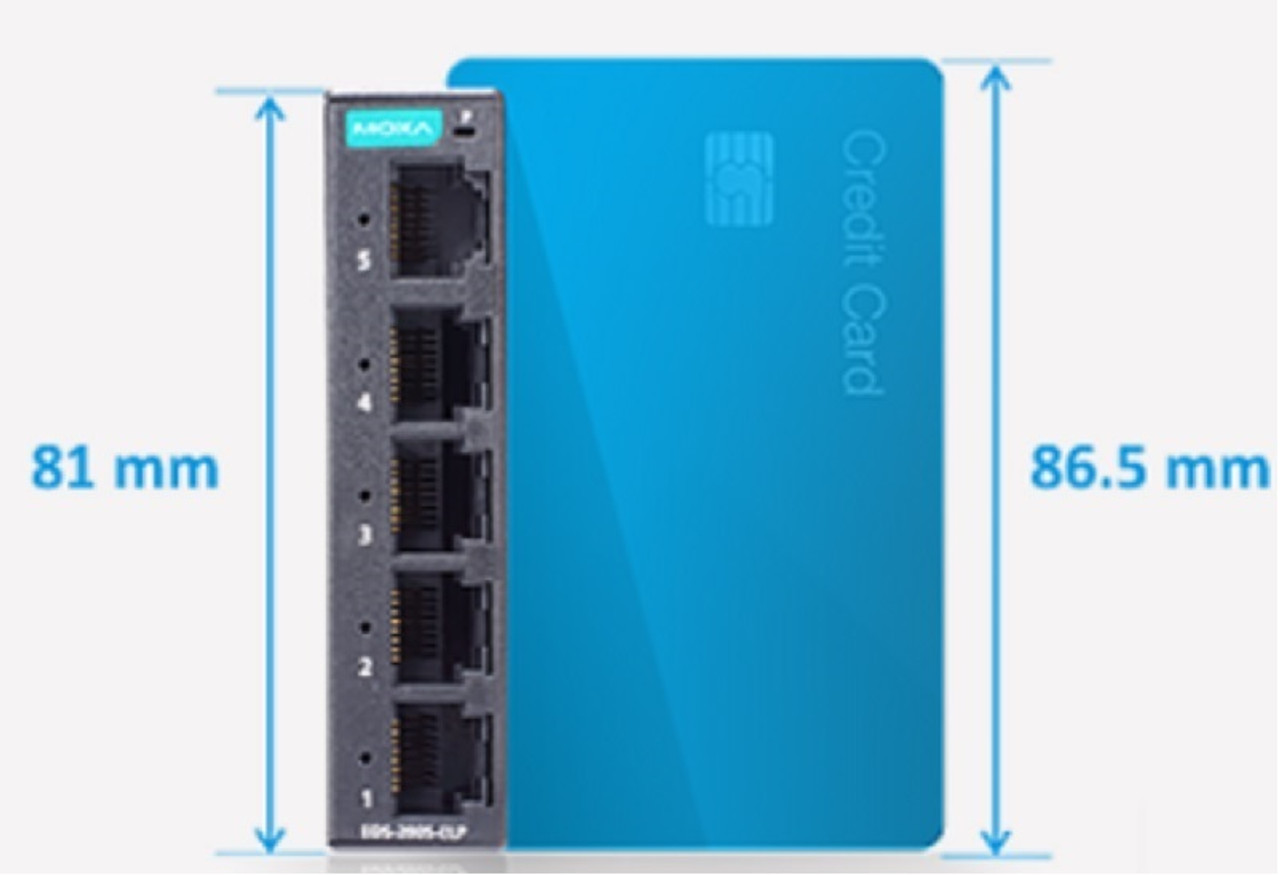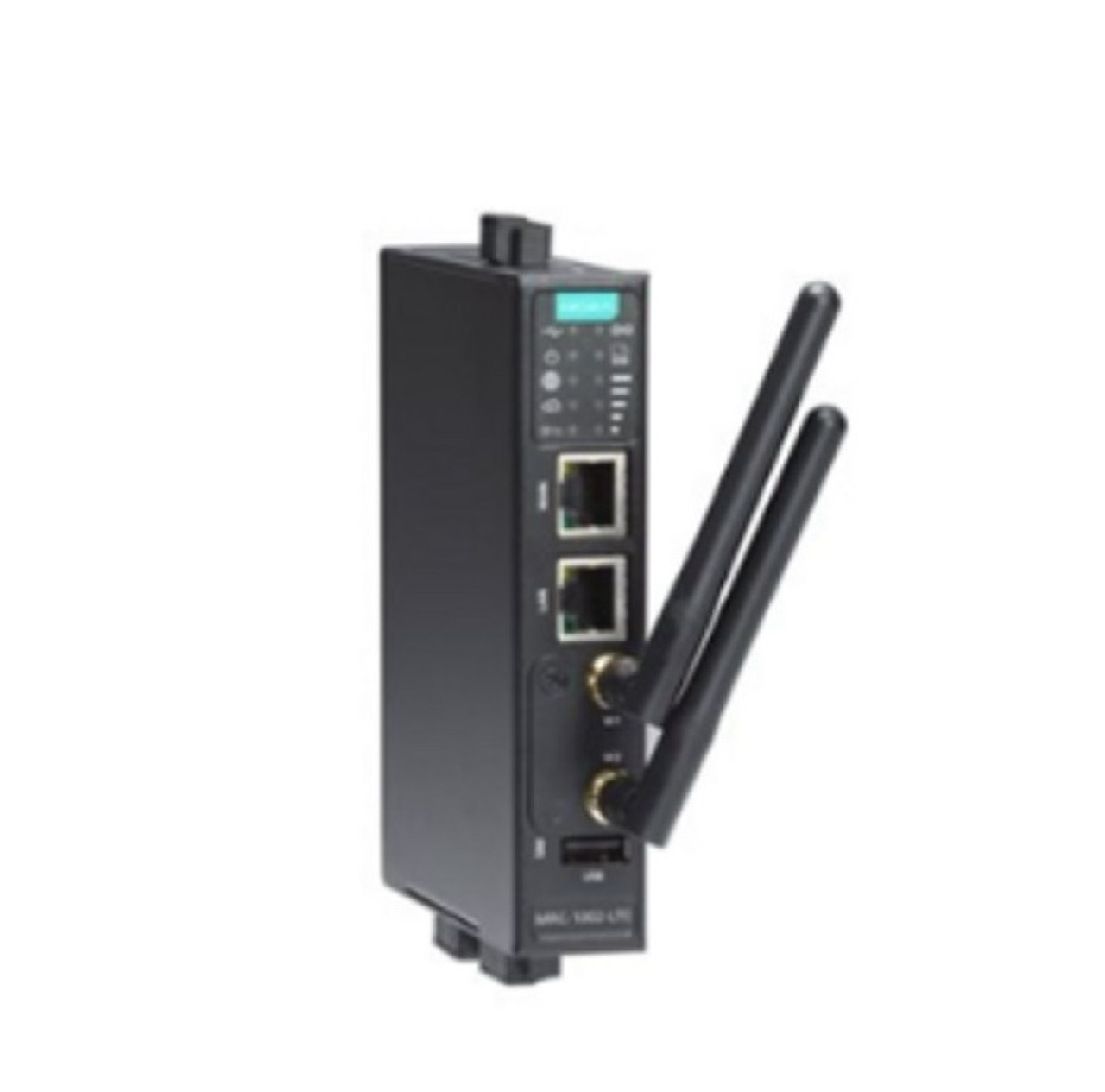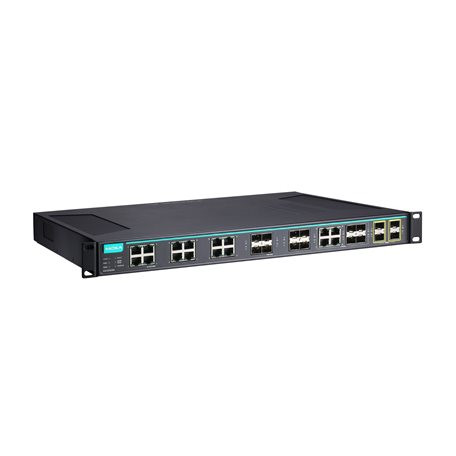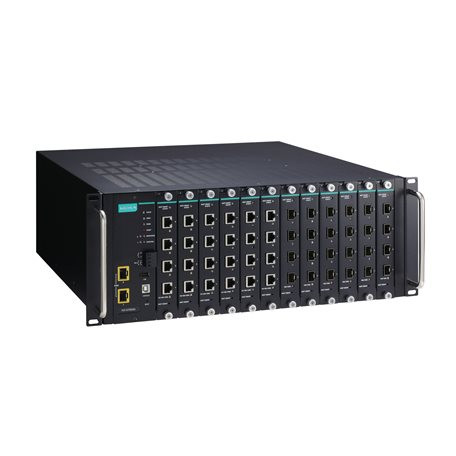
MOXA ICS-G7828A Series
Features and Benefits
- 24 Gigabit Ethernet ports plus up to 4 10G Ethernet ports
- Up to 28 optical fiber connections (SFP slots)
- Fanless, -40 to 75°C operating temperature range (T models)
- Turbo Ring and Turbo Chain (recovery time If the port link speed is 1 Gigabit or higher, the recovery time is , and STP/RSTP/MSTP for network redundancy
- Isolated redundant power inputs with universal 110/220 VAC power supply range
- Supports MXstudio for easy, visualized industrial network management
- V-ON™ ensures millisecond-level multicast data and video network recovery
| Product ID | Product Description | Availability | Price | Qty |
|---|
Introduction
Process automation and transportation automation applications combine data, voice, and video, and consequently require high performance and high reliability. The ICS-G7828A Series is equipped with 24 Gigabit Ethernet ports plus up to 4 10 Gigabit Ethernet ports, and support Layer 3 routing functionality to facilitate the deployment of applications across networks, making them ideal for large-scale industrial networks.
The ICS-G7828A’s full Gigabit capability increases bandwidth to provide high performance and the ability to quickly transfer large amounts of video, voice, and data across a network. The fanless switches support the Turbo Ring, Turbo Chain, and RSTP/STP redundancy technologies, and come with an isolated redundant power supply to increase system reliability and the availability of your network backbone.
Additional Features and Benefits
-
Layer 3 switching functionality to move data and information across networks
-
Command line interface (CLI) for quickly configuring major managed functions
-
Supports advanced VLAN capability with Q-in-Q tagging
-
DHCP Option 82 for IP address assignment with different policies
-
Supports EtherNet/IP, PROFINET, and Modbus TCP protocols for device management and monitoring
-
IGMP snooping and GMRP for filtering multicast traffic
-
IEEE 802.1Q VLAN and GVRP protocol to ease network planning
-
Port mirroring for online debugging
-
Automatic warning by exception through email and relay output
-
QoS (IEEE 802.1p/1Q and TOS/DiffServ) to increase determinism
-
Port Trunking for optimum bandwidth utilization
-
TACACS+, SNMPv3, IEEE 802.1X, HTTPS, and SSH to enhance network security
-
Access control lists (ACL) increase the flexibility and security of network management
-
SNMPv1/v2c/v3 for different levels of network management
-
RMON for proactive and efficient network monitoring
-
Bandwidth management to prevent unpredictable network status
-
Lock port function for blocking unauthorized access based on MAC address
-
Digital inputs for integrating sensors and alarms with IP networks
-
Redundant, dual AC power inputs








__28925.1702568510.jpg?c=1 80w, https://cdn11.bigcommerce.com/s-exhcjslbho/images/stencil/160w/products/3958/29140/moxa-ics-g7828a-series-image-1-(2)__28925.1702568510.jpg?c=1 160w, https://cdn11.bigcommerce.com/s-exhcjslbho/images/stencil/320w/products/3958/29140/moxa-ics-g7828a-series-image-1-(2)__28925.1702568510.jpg?c=1 320w, https://cdn11.bigcommerce.com/s-exhcjslbho/images/stencil/640w/products/3958/29140/moxa-ics-g7828a-series-image-1-(2)__28925.1702568510.jpg?c=1 640w, https://cdn11.bigcommerce.com/s-exhcjslbho/images/stencil/960w/products/3958/29140/moxa-ics-g7828a-series-image-1-(2)__28925.1702568510.jpg?c=1 960w, https://cdn11.bigcommerce.com/s-exhcjslbho/images/stencil/1280w/products/3958/29140/moxa-ics-g7828a-series-image-1-(2)__28925.1702568510.jpg?c=1 1280w, https://cdn11.bigcommerce.com/s-exhcjslbho/images/stencil/1920w/products/3958/29140/moxa-ics-g7828a-series-image-1-(2)__28925.1702568510.jpg?c=1 1920w, https://cdn11.bigcommerce.com/s-exhcjslbho/images/stencil/2560w/products/3958/29140/moxa-ics-g7828a-series-image-1-(2)__28925.1702568510.jpg?c=1 2560w)
__10784.1702568510.jpg?c=1 80w, https://cdn11.bigcommerce.com/s-exhcjslbho/images/stencil/160w/products/3958/29141/moxa-ics-g7828a-series-image-2-(2)__10784.1702568510.jpg?c=1 160w, https://cdn11.bigcommerce.com/s-exhcjslbho/images/stencil/320w/products/3958/29141/moxa-ics-g7828a-series-image-2-(2)__10784.1702568510.jpg?c=1 320w, https://cdn11.bigcommerce.com/s-exhcjslbho/images/stencil/640w/products/3958/29141/moxa-ics-g7828a-series-image-2-(2)__10784.1702568510.jpg?c=1 640w, https://cdn11.bigcommerce.com/s-exhcjslbho/images/stencil/960w/products/3958/29141/moxa-ics-g7828a-series-image-2-(2)__10784.1702568510.jpg?c=1 960w, https://cdn11.bigcommerce.com/s-exhcjslbho/images/stencil/1280w/products/3958/29141/moxa-ics-g7828a-series-image-2-(2)__10784.1702568510.jpg?c=1 1280w, https://cdn11.bigcommerce.com/s-exhcjslbho/images/stencil/1920w/products/3958/29141/moxa-ics-g7828a-series-image-2-(2)__10784.1702568510.jpg?c=1 1920w, https://cdn11.bigcommerce.com/s-exhcjslbho/images/stencil/2560w/products/3958/29141/moxa-ics-g7828a-series-image-2-(2)__10784.1702568510.jpg?c=1 2560w)
__83150.1702568511.jpg?c=1 80w, https://cdn11.bigcommerce.com/s-exhcjslbho/images/stencil/160w/products/3958/29142/moxa-ics-g7828a-series-image-3-(2)__83150.1702568511.jpg?c=1 160w, https://cdn11.bigcommerce.com/s-exhcjslbho/images/stencil/320w/products/3958/29142/moxa-ics-g7828a-series-image-3-(2)__83150.1702568511.jpg?c=1 320w, https://cdn11.bigcommerce.com/s-exhcjslbho/images/stencil/640w/products/3958/29142/moxa-ics-g7828a-series-image-3-(2)__83150.1702568511.jpg?c=1 640w, https://cdn11.bigcommerce.com/s-exhcjslbho/images/stencil/960w/products/3958/29142/moxa-ics-g7828a-series-image-3-(2)__83150.1702568511.jpg?c=1 960w, https://cdn11.bigcommerce.com/s-exhcjslbho/images/stencil/1280w/products/3958/29142/moxa-ics-g7828a-series-image-3-(2)__83150.1702568511.jpg?c=1 1280w, https://cdn11.bigcommerce.com/s-exhcjslbho/images/stencil/1920w/products/3958/29142/moxa-ics-g7828a-series-image-3-(2)__83150.1702568511.jpg?c=1 1920w, https://cdn11.bigcommerce.com/s-exhcjslbho/images/stencil/2560w/products/3958/29142/moxa-ics-g7828a-series-image-3-(2)__83150.1702568511.jpg?c=1 2560w)
__06469.1702568511.jpg?c=1 80w, https://cdn11.bigcommerce.com/s-exhcjslbho/images/stencil/160w/products/3958/29143/moxa-ics-g7828a-series-image-4-(2)__06469.1702568511.jpg?c=1 160w, https://cdn11.bigcommerce.com/s-exhcjslbho/images/stencil/320w/products/3958/29143/moxa-ics-g7828a-series-image-4-(2)__06469.1702568511.jpg?c=1 320w, https://cdn11.bigcommerce.com/s-exhcjslbho/images/stencil/640w/products/3958/29143/moxa-ics-g7828a-series-image-4-(2)__06469.1702568511.jpg?c=1 640w, https://cdn11.bigcommerce.com/s-exhcjslbho/images/stencil/960w/products/3958/29143/moxa-ics-g7828a-series-image-4-(2)__06469.1702568511.jpg?c=1 960w, https://cdn11.bigcommerce.com/s-exhcjslbho/images/stencil/1280w/products/3958/29143/moxa-ics-g7828a-series-image-4-(2)__06469.1702568511.jpg?c=1 1280w, https://cdn11.bigcommerce.com/s-exhcjslbho/images/stencil/1920w/products/3958/29143/moxa-ics-g7828a-series-image-4-(2)__06469.1702568511.jpg?c=1 1920w, https://cdn11.bigcommerce.com/s-exhcjslbho/images/stencil/2560w/products/3958/29143/moxa-ics-g7828a-series-image-4-(2)__06469.1702568511.jpg?c=1 2560w)
__04402.1770352858.jpg?c=1 80w, https://cdn11.bigcommerce.com/s-exhcjslbho/images/stencil/160w/products/3958/30573/moxa-ics-g7828a-series-image-1-(1)__04402.1770352858.jpg?c=1 160w, https://cdn11.bigcommerce.com/s-exhcjslbho/images/stencil/320w/products/3958/30573/moxa-ics-g7828a-series-image-1-(1)__04402.1770352858.jpg?c=1 320w, https://cdn11.bigcommerce.com/s-exhcjslbho/images/stencil/640w/products/3958/30573/moxa-ics-g7828a-series-image-1-(1)__04402.1770352858.jpg?c=1 640w, https://cdn11.bigcommerce.com/s-exhcjslbho/images/stencil/960w/products/3958/30573/moxa-ics-g7828a-series-image-1-(1)__04402.1770352858.jpg?c=1 960w, https://cdn11.bigcommerce.com/s-exhcjslbho/images/stencil/1280w/products/3958/30573/moxa-ics-g7828a-series-image-1-(1)__04402.1770352858.jpg?c=1 1280w, https://cdn11.bigcommerce.com/s-exhcjslbho/images/stencil/1920w/products/3958/30573/moxa-ics-g7828a-series-image-1-(1)__04402.1770352858.jpg?c=1 1920w, https://cdn11.bigcommerce.com/s-exhcjslbho/images/stencil/2560w/products/3958/30573/moxa-ics-g7828a-series-image-1-(1)__04402.1770352858.jpg?c=1 2560w)
__00675.1770352858.jpg?c=1 80w, https://cdn11.bigcommerce.com/s-exhcjslbho/images/stencil/160w/products/3958/30574/moxa-ics-g7828a-series-image-2-(1)__00675.1770352858.jpg?c=1 160w, https://cdn11.bigcommerce.com/s-exhcjslbho/images/stencil/320w/products/3958/30574/moxa-ics-g7828a-series-image-2-(1)__00675.1770352858.jpg?c=1 320w, https://cdn11.bigcommerce.com/s-exhcjslbho/images/stencil/640w/products/3958/30574/moxa-ics-g7828a-series-image-2-(1)__00675.1770352858.jpg?c=1 640w, https://cdn11.bigcommerce.com/s-exhcjslbho/images/stencil/960w/products/3958/30574/moxa-ics-g7828a-series-image-2-(1)__00675.1770352858.jpg?c=1 960w, https://cdn11.bigcommerce.com/s-exhcjslbho/images/stencil/1280w/products/3958/30574/moxa-ics-g7828a-series-image-2-(1)__00675.1770352858.jpg?c=1 1280w, https://cdn11.bigcommerce.com/s-exhcjslbho/images/stencil/1920w/products/3958/30574/moxa-ics-g7828a-series-image-2-(1)__00675.1770352858.jpg?c=1 1920w, https://cdn11.bigcommerce.com/s-exhcjslbho/images/stencil/2560w/products/3958/30574/moxa-ics-g7828a-series-image-2-(1)__00675.1770352858.jpg?c=1 2560w)
__87876.1770352858.jpg?c=1 80w, https://cdn11.bigcommerce.com/s-exhcjslbho/images/stencil/160w/products/3958/30575/moxa-ics-g7828a-series-image-3-(1)__87876.1770352858.jpg?c=1 160w, https://cdn11.bigcommerce.com/s-exhcjslbho/images/stencil/320w/products/3958/30575/moxa-ics-g7828a-series-image-3-(1)__87876.1770352858.jpg?c=1 320w, https://cdn11.bigcommerce.com/s-exhcjslbho/images/stencil/640w/products/3958/30575/moxa-ics-g7828a-series-image-3-(1)__87876.1770352858.jpg?c=1 640w, https://cdn11.bigcommerce.com/s-exhcjslbho/images/stencil/960w/products/3958/30575/moxa-ics-g7828a-series-image-3-(1)__87876.1770352858.jpg?c=1 960w, https://cdn11.bigcommerce.com/s-exhcjslbho/images/stencil/1280w/products/3958/30575/moxa-ics-g7828a-series-image-3-(1)__87876.1770352858.jpg?c=1 1280w, https://cdn11.bigcommerce.com/s-exhcjslbho/images/stencil/1920w/products/3958/30575/moxa-ics-g7828a-series-image-3-(1)__87876.1770352858.jpg?c=1 1920w, https://cdn11.bigcommerce.com/s-exhcjslbho/images/stencil/2560w/products/3958/30575/moxa-ics-g7828a-series-image-3-(1)__87876.1770352858.jpg?c=1 2560w)
__37701.1770352859.jpg?c=1 80w, https://cdn11.bigcommerce.com/s-exhcjslbho/images/stencil/160w/products/3958/30576/moxa-ics-g7828a-series-image-4-(1)__37701.1770352859.jpg?c=1 160w, https://cdn11.bigcommerce.com/s-exhcjslbho/images/stencil/320w/products/3958/30576/moxa-ics-g7828a-series-image-4-(1)__37701.1770352859.jpg?c=1 320w, https://cdn11.bigcommerce.com/s-exhcjslbho/images/stencil/640w/products/3958/30576/moxa-ics-g7828a-series-image-4-(1)__37701.1770352859.jpg?c=1 640w, https://cdn11.bigcommerce.com/s-exhcjslbho/images/stencil/960w/products/3958/30576/moxa-ics-g7828a-series-image-4-(1)__37701.1770352859.jpg?c=1 960w, https://cdn11.bigcommerce.com/s-exhcjslbho/images/stencil/1280w/products/3958/30576/moxa-ics-g7828a-series-image-4-(1)__37701.1770352859.jpg?c=1 1280w, https://cdn11.bigcommerce.com/s-exhcjslbho/images/stencil/1920w/products/3958/30576/moxa-ics-g7828a-series-image-4-(1)__37701.1770352859.jpg?c=1 1920w, https://cdn11.bigcommerce.com/s-exhcjslbho/images/stencil/2560w/products/3958/30576/moxa-ics-g7828a-series-image-4-(1)__37701.1770352859.jpg?c=1 2560w)





